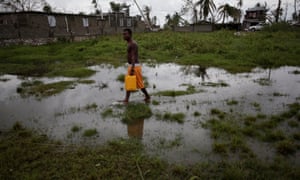
‘A great problem in Haiti is a lack of investment – not humanitarian funds.’ Photograph: Andres Martinez Casares/Reuters
Thursday 6 October 2016 16.40 EDTLast modified on Thursday 6 October 2016 16.46 EDT
On Tuesday, Hurricane Matthew moved slowly through Haiti’s south-west armed with heavy rain and 145 miles per hour wind. Any country subjected to a category 4 hurricane would suffer great damage to its infrastructure. Haiti, however, experienced a catastrophe.
Because of that, you are certain to see more pictures of a devastated Haiti in the next few days. Yet westerners wanting to help shouldn’t assume that there are no resources available to Haitians in country. They may not be sufficient and may become depleted quickly, but there are resources. While charitable goods may provide temporary relief, they can hinder recovery in the long run to the extent that they can have a negative impact on the local economy.
A great problem in Haiti is a lack of investment – not humanitarian funds – and that is evident in the aftermath of Matthew. Neither Haitian authorities nor their international allies have invested much in response capacity. The international community’s lack of trust and confidence in Haitian authorities leads to reliance on international NGOs. This results in a piecemeal approach to addressing Haiti’s serious shortcomings.
The hurricane lifted off roofs and destroyed much of the housing stock in Les Cayes and Jérémie, the two major provincial capitals in the south-west. It washed out roads and destroyed bridges, halting regular commerce and travel. Authorities have reported that more than 100 people have lost their lives. Haitians expect the toll to be much higher. A slow, frustrating recovery process is certain to follow, hampered by outbreaks of water-borne diseases such as cholera. Whether it will be successful is unclear.
The country’s vulnerability is compounded by lack of preparedness and insufficient management capacity. One may be suddenly jolted from bed by a severe unexpected earthquake, but we get yearly projections of the number of hurricanes that might develop in the Atlantic Ocean. And when either tropical storms or hurricanes arise, there are sufficient warnings about their paths and potential severity.
Haiti did issue warnings and deployed some resources for disaster relief. But it’s long been the case that Haiti and its international allies have allocated too few resources to disaster prevention or post-disaster relief, hoping instead that the country will be miraculously spared.
For instance, the Haiti Reconstruction Fund – a fund established in 2010 and managed by the World Bank on behalf of various donor countries – disbursed this year through 30 June just $16.7m out of a total of $351m for disaster relief purposes. One of the reasons why only a tiny fraction of that money has been used is that most of the money is meant to be used for earthquake reconstruction.
Relief aid should be empowering. It should be delivered quickly to meet urgent needs, not be used as a permanent channel for relieving normal stress and pain associated with development woes. In times of tragedy, it is important to distinguish between the do-gooders and the predators. It is quite easy for predators to have the upper hand when they can cast themselves as valuable intermediaries.
Hurricane Matthew has disrupted the expected course of events. We should not seek to put Haiti back on course. We need to change course altogether, use disruption to identify another course of action in consultation with Haitians.
- Haiti is a relatively vibrant society endowed with smart and resourceful citizens who have a better idea of the possible than even the most diploma-laden foreign experts. We shouldn’t assume that Haitians are so impoverished and weak that they can’t fend for themselves. We just need to ensure that domestic resources are supplemented, not supplanted.